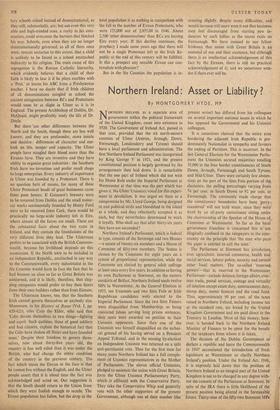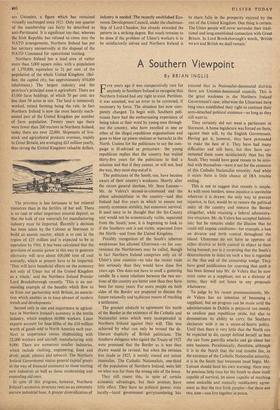Northern Ireland: Asset or Liability?
By MONTGOMERY HYDE, MP NORTHERN IRELAND, as a separate area of government within the political framework of the United Kingdom, came into existence in 1920. The Government of Ireland Act, passed in that year, provided that the six north-eastern counties of Ulster (Antrim, Armagh, Down, Fermanagh, Londonderry and Tyrone) should have a local parliament and administration. The first Northern Ireland Parliament was inaugurated by King George V in 1921, and the present constitutional position is largely governed by the arrangements then laid down. It is remarkable that the one part of Ireland which did not wish for Home Rule under the Imperial Parliament at Westminster at that time was the part which was given it. No Ulster Unionists voted for this experi- ment in devolution. It was urged on them as a compromise by Mr. Lloyd George, being designed to end political strife and bloodshed in the island as a whole, and they reluctantly accepted it as such, but they nevertheless determined to work it loyally. Who shall say that after thirty-six years they have not succeeded?
Northern Ireland's Parliament, which is federal in type, consists of the Sovereign and two Houses —a senate of twenty-six members and a House of Commons of fifty-two members. The Senate is chosen by the Commons for eight years on a system of proportional representation, while the Commons are elected by general adult suffrage at least once every five years. In addition to having its own Parliament at Stormont, on the eastern outskirts of Belfast, Northern Ireland sends twelve MPs to Westminster. At the General Election in 1955, ten Unionists and two Sinn. Fein or Irish Republican candidates were elected to the Imperial Parliament. Since the two Sinn Feiners were disqualified from Membership, as being convicted felons serving long prison sentences, their seats were awarded on petition to their Unionist opponents. Since then one of the Unionists was himself disqualified on the techni- cal ground of his having served on a Pensions Appeal. Tribunal, and in the ensuing by-election an Independent Unionist was returned on a split anti-partitionist vote. Thus for the first time for many years Northern Ireland has a full comple- ment of Unionist representatives in the Mother of Parliaments. The eleven official Unionists, pledged to maintain the union with Great Britain, form the Ulster Unionist Parliamentary Party, which is affiliated with the Conservative Party. They take the Conservative Whip and generally yote with the other supporters of the present Government, although one of their number (the present writer) has differed from his colleagues on several important national issues in which he has opposed the Government and his Unionist colleagues.
It is sometimes claimed that the entire area bordering the adjacent Irish Republic is pre- dominantly Nationalist' in sympathy and favours the ending of Partition. This is incorrect. In the last General Election for the Westminster Parlia- ment the Unionists secured majorities totalling 35,000 in the four border constituencies of South Down, Armagh, Fermanagh and South Tyrone, and Mid-Ulster. There were certainly few absten- tions on the part of the Sinn Fein portion of the electorate, the polling percentages varying from 74 per cent. in 'South Down to 92 per cent, in Fermanagh. The commonly made charge that the constituency boundaries have been 'gerry- mandered' will not hold water, since they were fixed by an all-party commission sitting under the chairmanship of the Speaker of the House of Commons at Westminster. So far as the• local government franchise is concerned this is not illogically confined to the ratepayers in the com- munity on the principle that 'the man who pays the piper is entitled to call the tune.'
The Parliament at Stormont has jurisdiction over agriculture, internal commerce, health and social services, labour police, security and certain other local matters. The so-called 'reserved powers'—that is, reserved to the Westminster Parliament--include defence, foreign affairs, over:.
seas trade, postal services,. coinage and virtually all taxation except estate duty, entertainment duty, stamp duty, motor licences and the road fund.
Thus, approximately 90 per cent. of the taxes raised in Northern Ireland, including income tax at the standard rate, are levied by the United Kingdom Government and are paid direct to the Treasury in London. Most of this money, how- ever, is handed back to the Northern Ireland Minister of Finance to be spent for the benefit of the taxpayers from whom it is taken.
The decision of the Dublin Government to declare a republic and leave the Commonwealth in 1947 necessitated the introduction of fresh legislature at Westminster to clarify Northern Ireland's position. Under the Ireland Act, 1948, it is expressly laid down that the position of Northern Ireland as an integral part of the United Kingdom is not to be changed in any degree with- out the consent of the Parliament at Stormont. In spite of the IRA there is little likelihood of the present position being altered in the foreseeable future. Thirty-nine of the fifty-two Stormont MPs
are Unionists, a figure which has remained virtually unchanged since 1921. Only one quarter of the membership can fairly be described as anti-Partitionist. It is significant too that, whereas the Irish Republic has refused to come into the NATO arrangements, Northern Ireland has put her territory unreservedly at the disposal of the NATO Command for operational training.
Northern Ireland has a land area of rather more than 5,000 square miles, with a population of 1,370,000, equivalent to 24 per cent. of the population of the whole United Kingdom. (Bel- fast, the capital city, has approximately 454,000 inhabitants.) The largest industry and the province's principal asset is agriculture. There are 83,000 farm holdings, of which 70 per cent. are less than 50 acres in size. The land is intensively worked, mixed farming being the rule. In fact Northern Ireland is now the most heavily mech- anised part of the United Kingdom per number of farm population. Twenty years ago there were fewer than 200 tractors in Northern Ireland, today there are over 22,000. Shipments of live- stock and agricultural products overseas, mainly to Great Britain, are averaging £63 million yearly, thus saving the United Kingdom valuable dollars.
The province is less fortunate in her mineral resources than in the fertility of her soil. There is no coal or other important mineral deposit, so that the bulk of raw materials for manufacturing industry must be imported. Recently a decision has been taken by the Cabinet at Stormont to build an atomic reactor, which is to cost in the region of £25 million and is expected to be in operation by 1961. It has been calculated that the provision of atomic power in this way to generate electricity will save about 600,000 tons of coal annually, which at present have to be imported. `That will have beneficial effects on the economy not only of Ulster but of the United Kingdom as a whole,' said the Northern Ireland Premier Lord Brookeborough recently. 'This is an out- standing example of the benefits which flow to us from our partnership with Britain, an associa- tion which enables us to keep abreast of modern trends and developments.'
Second only in size and importance to agricul- ture in Northern Ireland's economy is the textile industry, which employs 60,000 workers, Linen exports account for four-fifths of the £10 million worth of goods sold to North America each year. Next in importance comes shipbuilding with 22,000 workers and aircraft manufacturing with 9,000. There are numerous smaller industries, which include clothing, engineering, food and drink, paint, plastics and tobacco. The Northern Ireland Government makes general capital grants in the way of financial assistance to those starting new industries as well as those modernising and expanding old ones.
In spite of this progress, however, Northern Ireland's economic structure rests on an extremely narrow industrial base. A greater diversification of industry is needed. The recently established Eco- nomic Development Council, under the chairman- ship of Lord Chandos, has already extended the pattern in a striking degree. But much remains to be done if the problem of Ulster's workers is to be satisfactorily solved and Northern Ireland is to share fully in the prosperity enjoyed by the rest of the United Kingdom. One thing is certain. The Ulster people will never surrender their tradi- tional and long-established connection with Great Britain. In Lord Brookeborough's words, 'British we are and British we shall remain.'











































 Previous page
Previous page